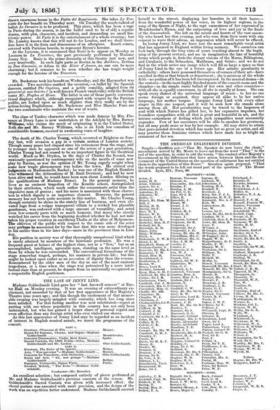The death of Mr. Charles Young, which occurred at Brighton
on Sun- day last, will occasion a gap in a certain section of London society. Though many years had elapsed since his retirement from the stage, and to younger men he appeared as one of the actors of a past generation, Charles 'Young had not ceased to be an important figure in the theatrical world. Much as Mr. Dryden, in the days of Charles the Second, was anxiously questioned by contemporary wits on the merits of some new play by Racine, so was the opinion of Mr. Young eagerly sought when some new tragic phenomenon was before the town. He uttered oral judgments on Mademoiselle Rachel; he was one of the English Hamlets who -witnessed the delineations of M. Emil Devrient ; and had he now been alive and well, he would have been seen about London dilating on the qualifications of Madame Ristori. In the general memory, he lives as an eminent tragedian of the Kemble school, distinguished by their attributes, which mark rather the consummate artist than the impulsive man of genius ; and his name is associated with those charac- ters in which dignity is an important element. However, the general memory has not been quite accurate in this matter. Mr. Charles Young, though certainly he shone in the stately line of business, and even ele- vated Iago from a vulgar transparent villain to a wicked but plausible gentleman, was endowed with a large amount of versatility, and acted even low-comedy parts with so much humour, that many who closely watched his career from the beginning doubted whether he had not mis- taken his proper vocation in sacrificing Thalia at the altar of Melpomene. The oblivion of the public with respect to the comic side of the actor may perhaps be accounted for by the fact that this was more developed in his earlier than in his later days—more in the provinces than in Lon- don.
His position in society was of that thoroughly unequivocal kind which is rarely attained by members of the histrionic profedsion. He was a frequent guest at houses of the highest class, not as a "lion," but as an accomplished, intelligent, agreeable man, standing on the same level as those by whom he was surrounded. The conventional formalisms of the stage somewhat tinged, perhaps, his manners in private life ; but this might be looked upon rather as an accession of dignity than the reverse. Remembered by the older men of the day as one of the most eminent tragedians, at a time when the stage was patronized by a more intel- lectual class than at present, he departs from us universally recognized as a respectable English gentleman.


































 Previous page
Previous page